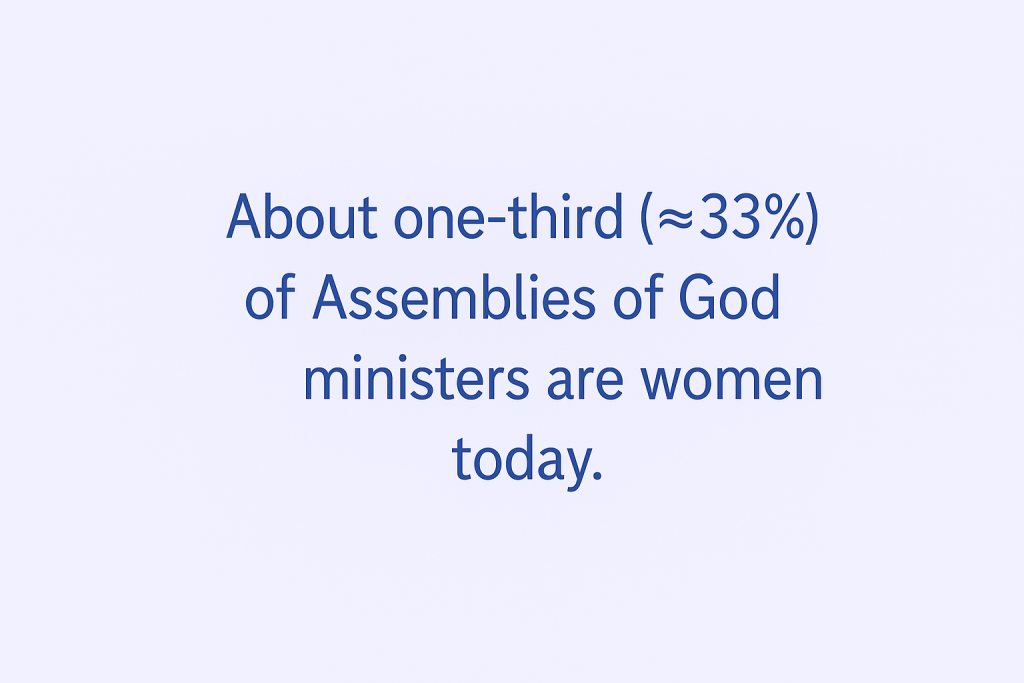Five Things We Will Learn
- How Pentecostal theology—rooted in Scripture and the Spirit’s gifts—supports women in every ministry role.
- What Paul’s “hot passages” (1 Corinthians 14; 1 Timothy 2) mean in literary, historical, and theological context.
- Concrete biblical and early-church evidence of women in leadership and speaking roles.
- Why culture and tradition have limited women—and how revival movements re-opened doors.
- Why a theology of women in ministry is ultimately a theology of healthy, Spirit-empowered ministry for the whole church.
Why Theology—and This Conversation—Matters
Theology is not reserved only for scholars or pastors; it belongs to every believer who cares about the things of God. Through theology, we come to know God as He has revealed Himself in Jesus Christ, and we discover what that revelation means for our salvation, our communities, and our very identity. In short, theology teaches us the most important things—the truths that define us and flow from God Himself.
In this discussion, Doug Clay, General Superintendent of the Assemblies of God, is joined by Dr. Alan Tennyson, theological counsel at the National Office for the Assemblies of God. Together they address a subject central to Pentecostal tradition and close to their own hearts: women in ministry and leadership.
From the very beginning, the Assemblies of God has affirmed that God calls women to every sphere of ministry. Whether as deacons, board members, children’s ministers, lead pastors, sectional presbyters, or even general superintendents, women have faithfully served the church. History is filled with their stories—Mariah Woodworth-Eder, Marie Burgess Brown, Lillian Trasher, Huldah Buntain, Dr. Melissa Alfaro, and Dr. Donna Barrett among them. Yet, despite this rich heritage, questions remain within parts of the Christian community about the role of women in leadership.
The Biblical Case for Women in Ministry and Leadership
Dr. Tennyson, why is that? I think there are two reasons why people struggle with the leadership of women. One is culture and the other is tradition. Most people come from a culture—at least many people do—where they just haven’t seen women in positions of leadership, in particular public leadership. So they’re already uncomfortable with it. And then we also have within Christianity a tradition of building a theology of women in ministry around two Pauline texts that are used to justify the exclusion of women at some level. And that tradition itself comes out of a cultural way of dealing with women. Now that’s just true in general. But I think today there’s one more specific reason, and it’s the rapid cultural change that we find ourselves in regarding how we understand sex and gender. Those rapid changes have led people to retreat back into a tradition that’s wrongly assumed to be a protection from those changes.
Okay. I feel like we’ve got to take some time and unpack what you just said there. But I want to ask first about why does our tradition support women in ministry without exclusion and where can that be found in Scripture?
So if someone was to ask me, “Where in the Bible does it allow men to be in leadership?” my answer wouldn’t be a particular verse or passage that addresses that question head-on. What I would show are the examples of God calling men to positions of leadership. So if someone asked me, “Where in the Bible does it allow women to be in leadership?” again, I would point to examples of God calling women. I can start with Genesis 1 and the idea that male and female together were created in the image of God—which means what? We convey the authority of God and represent that to the rest of creation. I could talk about the role that Adam and Eve play together in the garden as co-workers. Or I could get more specific and talk about people like Miriam, who served as a leader within the Israelite community alongside her brother Moses. I could talk about Deborah, one of the first judges; various prophets in the Old Testament who speak for God—Deborah, Huldah, the wife of Isaiah.
But when we come to the New Testament, we find this explosion of women in ministerial positions, many of whom are co-workers of the Apostle Paul. We could talk about Junia, who’s identified as “outstanding among the apostles.” We could talk about the daughters of Philip who are all prophets; Priscilla who clearly functions as a teacher; Phoebe who is called a deacon; Lydia who has her own house church.
Now, Pentecostals especially emphasize the biblical support of women in ministry roles—and that includes speaking roles and leadership roles—because of our emphasis on the gift of the Holy Spirit to empower all believers in all manner of spiritual gifts. The prophet Joel expressly says that when the Spirit is poured out on all flesh, one of those signs will be “your sons and your daughters will prophesy” (Joel 2:28). Peter quotes Joel on the day of Pentecost (Acts 2:17). And then when he talks about the gift of the Spirit at the end of his sermon, he says in Acts 2:38 that this gift is for you, your children, and those who are far off—without any hint of gender distinction in receiving or working out the gift of the Spirit. To do what? To empower all believers. When Paul talks about spiritual gifts in 1 Corinthians 12, again, there’s no distinction in gender implied by his language of “to everyone… to each one.” All these examples given to us in the New Testament showcase women in all types of ministry and leadership roles.
The “Hot Passages” and What They Actually Address
So let’s talk about the hot Scriptures that are used to deny women a role in church leadership. There are primarily two texts in Paul from which others build a theology that restricts women in ministerial roles.
Related:
1 Corinthians 14:34–35 — What Kind of “Silence”?
1 Corinthians 14:34–35 says women should remain silent in church. One interpretation has been that Paul has written this letter partly to address problems in Corinthian worship gatherings. He doubles down in 1 Corinthians 12 on the giftedness of every member, talks about how those gifts should be used, and then—some assume—at the very end he adds, “except for women; no speaking gifts for them.”
But right away we have to admit: no one applies that passage as it reads on the surface. I know of no church that tells women they aren’t allowed to speak once they’re in a church gathering. Even the idea “speak to your husband at home”—I’ve never heard a pastor say to wives in a church, “You can’t talk to your husbands once you’re in the building.” So no one’s actually reading it that way. We have to ask: what kind of speech is Paul restricting? He’s referring to a particular kind.
He’s already talked in 1 Corinthians 11 about how men and women are to pray and prophesy publicly. So the speech he’s not restricting is speech that addresses the community; that’s off the table. We also know that whatever speech he’s restricting, the “answer” he gives is, “ask your husbands at home.” Two clarifications help: (1) he’s narrowing this to wives (Greek “gynē” can mean woman or wife), and (2) “ask” can be rendered “interrogate.”
Many scholars suggest some wives were interrupting worship services—1 Corinthians 14 is heavily about disruption—and Paul’s answer is: don’t interrupt the service because you don’t understand; interrogate your husbands at home (and husbands, bring your wives up to speed!).
But there’s another—and I think better—reading that fits the flow of the chapter. Paul gives three “be silent” directives: (1) if there’s tongues without interpretation, be silent; (2) prophets, if another receives a revelation, the first should be silent; and (3) the judging of prophecy. Likely Paul is saying that during the judgment of prophecy, wives shouldn’t seize that moment to interrogate their husbands publicly; have that discussion at home. No marriage disputes should interrupt the service—hence “disgraceful.” In sum, Paul isn’t excluding women from speaking ministries; he’s safeguarding orderly worship.
1 Timothy 2:1–15 — Learning, Teaching, and “Authority”
Read it in context. In 1 Timothy 1:3 Paul sends Timothy to Ephesus to deal with false teachers. He then addresses women’s dress—not as runway competition or status signaling—but calls them to learn “in quietness and submission.” “Quietness” means calmness (the same word Paul uses for all Christians in public life). “Submission” is the standard posture of a disciple toward a rabbi. The one explicit command is that women are to learn.
The contested line—“I do not permit a woman to teach or to have authority over a man; she must be quiet”—can be rendered, “I do not permit a woman to teach in order to dominate a man.” The rare Greek term for “authority” here (authentein) has a negative sense of usurpation or domination. Paul is correcting the misuse of a gift, not the misuse of a gender—especially amid false teaching. Some also read this as addressing wives and husbands in particular (same Greek words), prohibiting wives from using teaching to dominate their husbands.
Ephesus was home to the cult of Artemis (goddess associated with childbirth). That cult inverted creation order (woman first), and women prayed to Artemis for safe delivery. Paul likely counters that cultural story: Adam came first in the story; Eve was deceived (so could anyone be); and it is Christ—not Artemis—who “saves” through childbearing. Read woodenly, the passage would require childbirth for salvation—contradicting Paul elsewhere. Context resolves the tension and coheres with Paul’s affirmation of women leaders across his letters.
Why Context, Context, Context Matters
Biblical interpretation is like real estate: location, location, location—context, context, context. Read every verse within its passage (historical context), within its book (literary context), and within the whole canon (theological context). No one actually takes 1 Corinthians 14 “at face value” to silence all female speech in Christian gatherings. And if one tries to curtail women’s teaching “to men,” practical contradictions arise with Paul’s instructions about older women training younger women, honoring female elders, and the everyday life of the church. When we draw lines like “pastor but not lead pastor,” those lines aren’t coming from the text—they’re imported. Read in context, Paul is not excluding women on the basis of being women; he is pastoring specific congregations toward order and health.
Evidence of Women in Leadership in the New Testament and Early Church
We do have evidence. The New Testament names women in ministry and leadership. Early archaeology and art show women overseeing sacramental moments; a woman is even named a bishop in one inscription. Adult women often baptized adult women.
As the second and third centuries progressed, leadership offices hardened: one bishop over a city with presbyters and deacons. As churches moved from homes into public spaces, many communities—conceding to broader culture—excluded women from public leadership. Another shift came when pastors were analogized to Old Testament priests. But Christ is our High Priest; the sacrificial system is fulfilled. For Protestants, Scripture stands above tradition. Yet Protestants sometimes still borrowed the “two-text tradition” to exclude women—an interpretation at odds with Protestant principles and New Testament patterns.
How Revival and Pentecostal Movements Re-Opened Doors
Even when lines were drawn, spiritual gifts found a way. Medieval and early-modern women exercised leadership through monasticism and abbeys; figures like Julian of Norwich, Hildegard of Bingen, and Catherine of Siena taught and prophesied. After the Reformation ended monastic avenues, new paths emerged: pastor’s wives who truly led; “church mothers” in Black church traditions; women evangelists in revival movements. Methodists and other revivalists recognized women’s preaching gifts and re-examined Scripture accordingly. Today about half of Protestant denominations ordain women. The “minority” whole-Bible tradition (as opposed to the “two-text” tradition) argues that women’s leadership extends from the New Testament era forward—not insisting on a 50/50 split, but on Spirit-led opportunity for both sexes. Pentecostal and charismatic growth has been fueled, in part, by mobilizing the whole body—including women—under the Spirit’s gifts. Today, roughly one-third of Assemblies of God ministers are women.
Why Resistance Persists—and Why It Matters for All Ministry
In theory, the Assemblies of God has long affirmed women in ministry; in practice, we haven’t always lived it consistently. At the founding General Council, about a third of attendees were women, yet early policy restricted leadership roles. Women could evangelize and do missions—but not lead churches—though evangelism and missions produce churches. Historically, women planted churches and then men were installed to lead them. Voting and pastoral leadership opened more fully later (by 1935). In the present, some resistance stems from broader cultural tides: in reaction to sexual and gender confusion, some treat restricting women as a bulwark. But our affirmation of women in leadership is not capitulation to culture—we practiced it before women could vote. For us, this has always been about biblical authority and a robust doctrine of the Spirit.
And this isn’t merely about women’s rights. Excluding women on the basis of being women implies ministry is reserved for certain Christians due to something intrinsic to them rather than the call of Christ. That widens the (unbiblical) gap between “leaders” and “laity,” contradicting Genesis 1, Galatians 3, and Paul’s vision of a gifted body.
A Theology of Women in Ministry Is a Theology of the Church
If you exclude women due to being women, you are saying something intrinsic to womanhood disqualifies them. Historically, some interpreters said exactly that—women are “weaker” and should be spared the burden of leadership. Scripture paints a different picture: male and female, equally image-bearers; Eve from Adam’s side as a co-worker; hierarchy over women introduced at the Fall, not at creation—and being undone in Christ. In Christ, distinctions remain as created goods (male/female, Jew/Gentile), but the value-hierarchies that divide are stripped of status. The Spirit is free to distribute gifts “as He wills” for the edification of the whole body. We don’t resist cultural confusion by turning the sexes into different kinds of humans; male and female are different, yet together fully human, made for union and mutual dependence (1 Corinthians 11:11). We need women in every role God might call a man—because that is what it means to be one body in Christ.
Closing Appeal to a Spirit-Led, Healthy Church
This is not just a topic about women in ministry; it’s about the whole church and its effectiveness. Health comes as all members bring their Spirit-given gifts to build one another up. Restricting people on intrinsic grounds does real spiritual harm—even when done by those sincerely aiming to honor Scripture. As Pentecostals, our heritage is to say “yes” to the Spirit’s call—on sons and daughters—and to recognize, equip, and release those gifts for the Great Commission through the local church.
A word to our daughters and women in leadership: we believe in your ministry. We need your leadership and calling. If you have not felt supported, I’m sorry. We believe in the One who called you, and we want you to exercise your God-given gifts to their fullest—so the church can fulfill its calling to the fullest. As the Assemblies of God, we support the ministry of women and men. Because we continually say yes to the Holy Spirit, we believe sons and daughters can be gifted for the fulfillment of the Great Commission through the local church. May it always be so among us.





